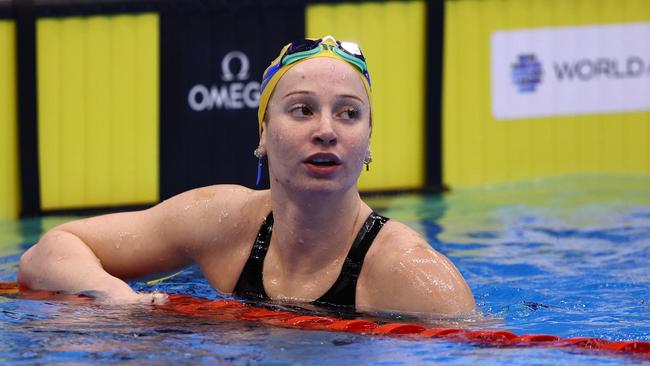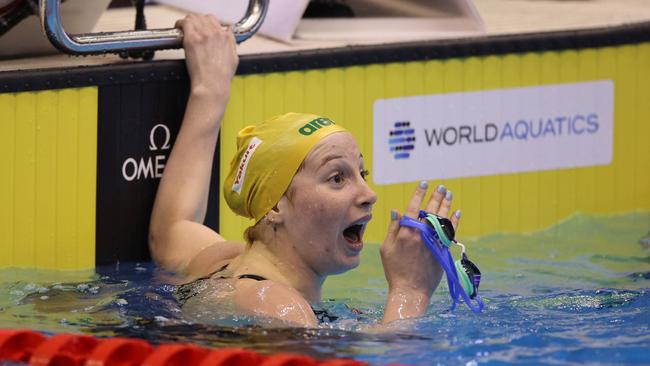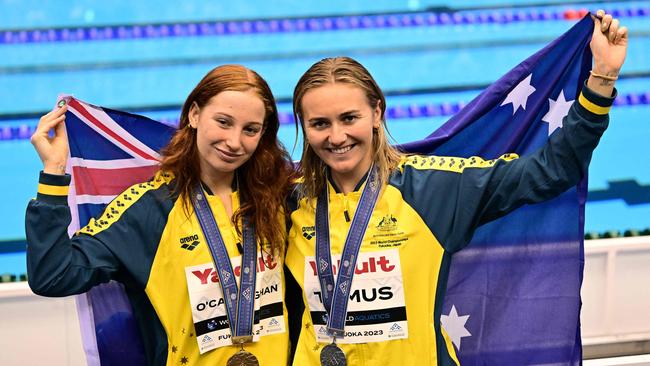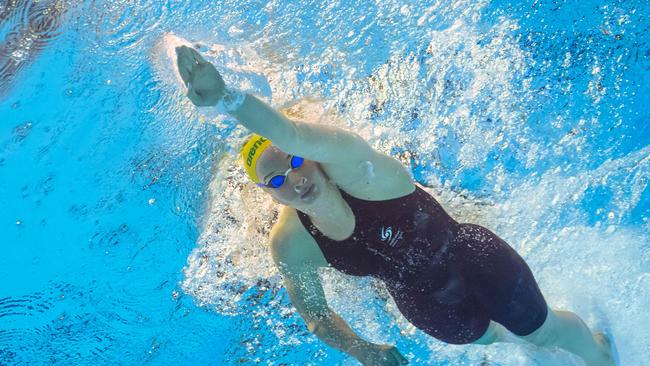World Swimming Championships: How Mollie O’Callaghan outpaced David Popovici in historic 200m freestyle final win
Ariarne Titmus may be a fast finisher, but she stood no chance of holding off Mollie O’Callaghan, who outpaced the fastest swimmer in history to claim gold for Australia.

As great as she is, Ariarne Titmus didn’t stand a chance of holding off Mollie O’Callaghan in their epic 200m freestyle final at the world championships in Japan.
In fact no-one could have stopped O’Callaghan from winning - and demolishing the oldest world record in women’s swimming - because her closing lap was out of this world.
Clocked at 28.11 seconds, O’Callaghan’s final length was so fast that she outpaced the fastest swimmer in history - Romanian David Popovici.
That’s right. O’Callaghan was faster than the fastest man who’s ever swum.
His last lap in the men’s 200m freestyle final in Fukuoka was 28.12.
Admittedly, Popovici didn’t win the men’s race and wasn’t at his absolute best, but he is no slouch.
He holds the 100m world record and is the third fastest man in history over 200m, so for O’Callaghan to finish quicker than him, she had to be motoring.

Titmus, the Olympic champion in both 200m and 400m, is a fast finisher also but she was powerless to stop her team mate.
Titmus looked to have the race at her mercy when she led through the first 150m, and came home in a respectable 29.01, only to be mowed down right at the death.
“I’m fortunate enough to watch these guys train so I’m not surprised at the way she was able to come home and get her hand on the wall and break a world record,” Australian head coach Rohan Taylor said.
“It’s usually around how she races and how she trains so for her performance, maybe the world record is always like ‘great’ but just the way she trains and what I see is coming out in competition as it is for Arnie as well. So it was a fun race to watch.”
Just 19, O’Callaghan is now the new poster girl of an Australia team already overflowing with talent.
She won three gold medals at last year’s world championships in Budapest and already has two in Fukuoka, with the 100m freestyle and three more relays still to come.
Her next big goal, of course, is the 2024 Paris Olympics.

If the Queenslander has a chink in her armour, it’s that she constantly battles severe anxiety before her races. But instead of letting it slow her down, it motives her to fight right to the finish.
“Mollie, knowing what she can do, if she’s close enough she is going to put herself in it. And obviously that’s what happened. If someone has got that capacity and they’re in the position to strike, it will be her,” Taylor said.
“She just gets into competition mode and, like all great athletes, wants to perform.
“She gets a bit nervous, like they all do, but channels that back into her performances.
“She is young and still learning and it’s still a big stage and it doesn’t go away but I think she just is able to channel all that nervousness into performance.”
Technically, O’Callaghan is a swimming machine, nailing all the little things underwater and at the turns that shave tiny fractions of seconds off each lap, which can prove the difference between winning and losing.
“She trains that really well,” Taylor said. “And the skill that she has, her ability to use her body, she’s a strong kicker.
“And then the way she paces, I think her stroke lends itself, she’s a very leg dominated swimmer so she just brings the legs in and just gets her body position in a different way and then she’s able to just kind of connect it up.
“But it’s also the way that she trains and the way she prepares herself in training is to do those.”

O’Callaghan has credited her flamboyant coach Dean Boxall for her success, while acknowledging it’s difficult for him.
Boxall, who became an internet sensation with his wild celebrations at the Tokyo Olympics, also trains Titmus, so has to give each swimmer their own specific instructions to try and win.
“It’s a testament to Dean. That is a mastery of coaching to be able to do that,” Australian breaststroker Zac Stubblety-Cook said.
“To have two world records in two different events at the same meet and then two swimmers gold and silvers in the event, swimming very differently, was very cool to watch and a testament to Dean.
“It’s an interesting one. Having Mollie and Arnie leading the pack of the women’s 200 in Australia is exciting. Anyone from our 200m final would have made the semi-finals here. They have the benefit of that internal competition.”
HEATING UP: AUSSIES STAKE CLAIM FOR MORE WORLD GOLD
Australian teenage swim sensation Mollie O’Callaghan was back in the pool the morning straight after her incredible world record in Fukuoka, looking unflustered as she chased her third and fourth gold medals of the championships.
The 19-year-old wondergirl has become the sport’s new poster girl after she shattered the oldest world record in women’s swimming to win the 200 metres freestyle gold on Wednesday night.
Her performance was all the more remarkable because she beat her training teammates Ariarne Titmus – who had broken the 400m world record on Sunday.
O’Callaghan also won a gold in the 4x100m freestyle relay and is eyeing more prizes after safely advancing to the individual 100m freestyle semi finals on Thursday.
Taking it easy, she won her heat to qualify seventh overall in 54.01.

Australia’s Emma McKeon, the Tokyo Olympic champion, also won her heat, stopping the clock at 53.40, to qualify third overall. Hong Kong’s Siobhan Haughey was the quickest qualifier (53.15).
Australia posted the second time in the heats of the women’s 4x200m freestyle final.
Madi Wilson, Lani Pallister, Brianna Throssell and Kiah Melverton set a combined time of 7: 47.84 – just behind the United States.
But with O’Callaghan, Titmus and Shayna Jack to come in for the final, the Aussies will be strong favourites to win the gold and break their own world record.
In what was another great morning for the Aussies, Olympic and world champion Zac Stubblety-Cook topped the qualifiers for the 200m breaststroke semi finals.
“It was good to have a little hit-out after last night, I got home late but I am excited for the next couple of steps,” he said.
“I am excited, my swim was a good swim, comfortable.
Australia’s Brad Woodward posted the fastest qualifying time in the men’s 200m backstroke and Abbey Harkin was sixth best in the women’s 200m breaststroke.






To join the conversation, please log in. Don't have an account? Register
Join the conversation, you are commenting as Logout